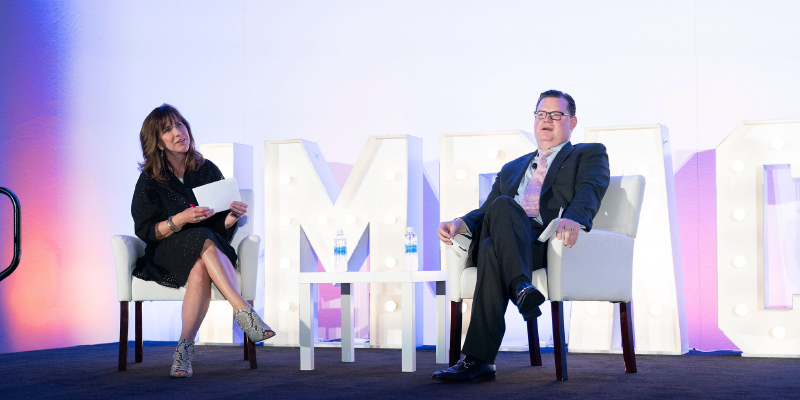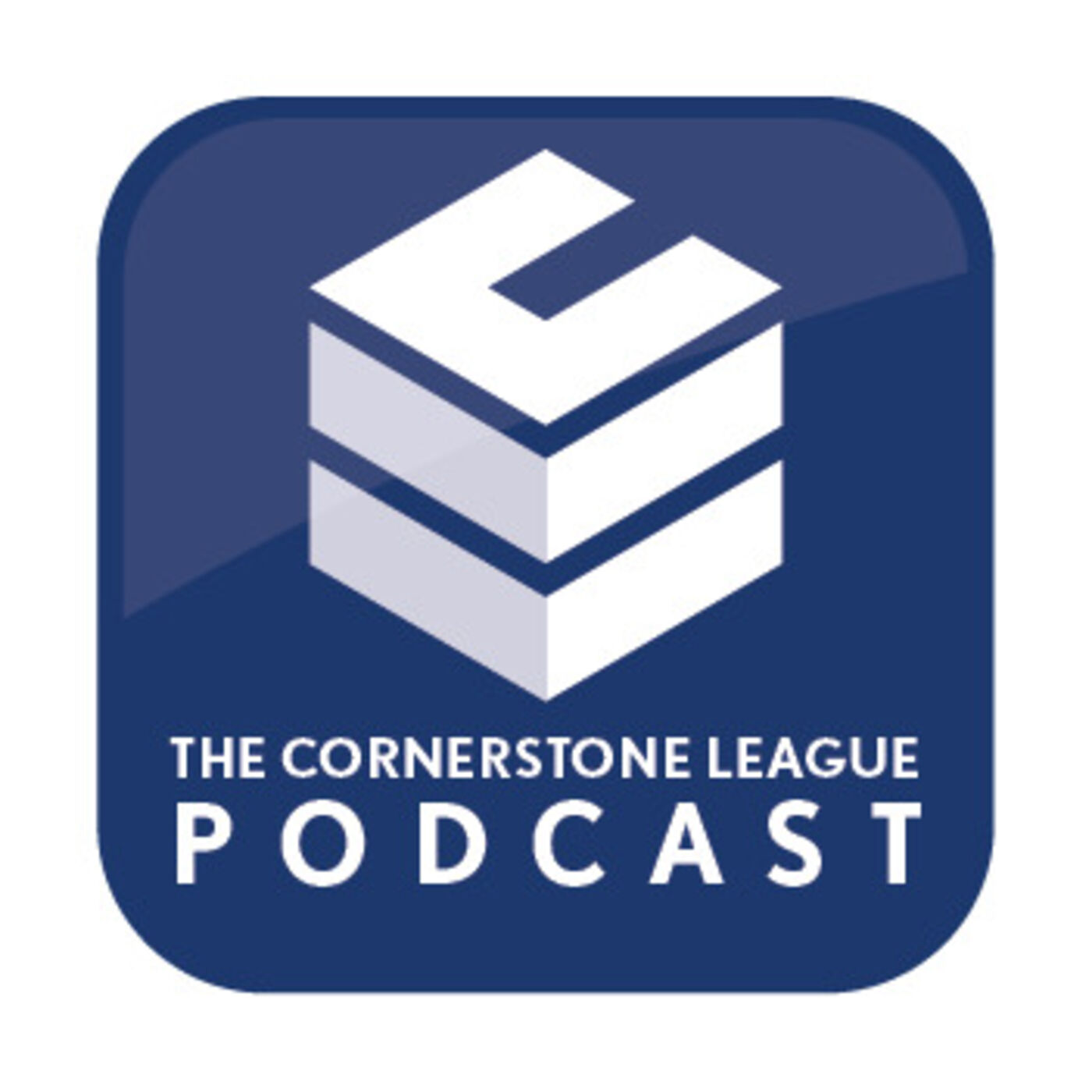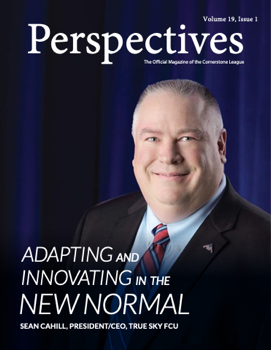

NCUA’s Hauptman Talks CECL, Succession Planning, Digital Assets, and More + Council Forums and Keith Gaddie, Ph.D.

Along with Cornerstone League President/CEO Caroline Willard, NCUA Vice Chair Kyle Hauptman kicked off day one of last week’s IMPACT 2022: Annual Meeting and Council Forum in an interview-style event center stage.
Hauptman shared the NCUA’s position on CECL and the climate. He clarified that CECL is not the agency’s rule and that if it was up to him, it would not exist. He also said CECL doesn’t really fit credit unions. “We don’t have any investors that will benefit from CECL,” he said. “Since it’s not an NCUA rule, we just want to get through it like you do.”
Although he and NCUA Chairman Todd Harper voted for the succession planning rule, Hauptman agrees with Board Member Rodney Hood that an actual rule may not be necessary. And he said credit union leaders need not look far for their future leaders.
“Looking to your YPs is a great way to approach succession planning,” he said. “Those are your future board members.”
Cornerstone League President/CEO Caroline Willard added her own advice for credit unions, especially small credit unions: “Don’t focus on the person. Create a process.”
On the topic of mergers, Hauptman said they should be market driven. “Consolidations happen across the financial services industry,” he said. “There should be as many credit unions as the American people want. We see conservatorships and we see mergers, and some of those mergers are perfectly happy events. It’s always more fun to go to weddings and baby showers than funerals.”
Hauptman complimented Cornerstone League on its innovation regarding cryptocurrency saying, “You have a good assessment of risk.”
Willard said that in addition to watching cryptocurrency closely, she wants to make sure credit unions will still be around in 100 years. One way is to embrace new technologies.
“I don’t want to see credit unions go the way of Blockbuster because their regulator didn’t let them do the things they needed to do to survive,” said Hauptman. “We’re trying to change the general view of risk. We’re not trying to be for or against things. We want to facilitate innovation.”
He said NCUA had two reasons for circulating guidance on digital assets in December. First, credit unions saw a high number of outflows going to exchange platforms like Coinbase, and second, people said they want their first foray into crypto investing to be through their trusted financial institution.
NCUA is working on a broad piece of guidance intended to stimulate the conversation around cryptocurrency, he said. It’s modeled after what he called “the greatest piece of D.C. policy making” in his lifetime: the 1996 Clinton-Gore White House principles for the information superhighway.
“Early guidance is more useful than late guidance,” he said. “We can win this blockchain industry as well. When the White House put out the internet guidance, the internet was just a bunch of web pages.”
Drawing on the parallel of the internet’s humble beginnings, Hauptman invited the audience to imagine blockchain’s potentially incredible, if uncertain, future and the possibilities that lie within.
“Blockchain is not going to be what we think is going to be,” Hauptman said. “There are going to be problems with anything new. Some vendors are going to go out of business. But what’s the greater risk? Not innovating.”
Hauptman also encouraged credit unions to seek alternate sources of income, implying that credit unions might need to step out of their comfort zone to innovate. “Give yourselves more ways to earn money,” he said. “That way you have more sources of income. Credit unions typically don’t like to raise their hands and ask, ‘can we do this?’ because if NCUA doesn’t like the idea, then you look like your credit union is under risky management.”
Willard and Hauptman also discussed field of membership, the importance of the human touch, and his take on financial inclusion.
“Being reached by a satellite 5G doesn’t create a common bond,” Hauptman said. “It just makes you an earthling. If no one else is serving an area or subgroup, that is where we should be more generous with field of membership. There is still value in in-person transactions. We could have done this conference virtually, but we did it here because in-person matters.”
Hauptman warned that organizations need to increase self-awareness, particularly when it comes to policies that facilitate diversity, equity, and inclusion. “Look at de novos,” he said abut new credit unions. “You know what was happening at the same time as [the death of] George Floyd? A woman in northern Minneapolis was struggling to try to start her own credit union and described the process as humiliating.”
Hauptman also referenced the difficulties that Debra Hurston, executive director of the Association of Black Economic Power, has faced in her years-long attempt at getting a de novo credit union off the ground. Recent news broke of some momentum building for the de novo credit union Village Financial Credit Union in north Minneapolis, an area Hurston has described as “riddled with payday lenders and fringe bankers.” The Black-led credit union in north Minneapolis would be the state’s first new credit union in about a decade if it launches as planned by the start of 2023.
“When we’re making it that difficult to let new financial services get started, we need to reevaluate what we’re doing,” he said. “If we are combatting that and our regulatory state is such, then we need to make some changes.”
Hauptman added, “Market forces can lead to the conservatorship of a credit union. This shouldn’t be the regulators’ job. That’s financial inclusion to me.”
Council Forums and Dr. Keith Gåddie

Attendees at day one of IMPACT 2022 got to experience two sets of All Access Council Forums, the Cornerstone Annual Business Meeting, Expo Solutions, and Forum Night. In addition, University of Oklahoma’s Keith Gåddie, Ph.D., delivered remarks
on Civic Engagement in a Contentious Public Space.
Gåddie discussed the fractures in American political ideology, as seen in the attack on the U.S. Capitol on Jan. 6, 2021. He said these fractures are causing historians and political scientists to explore the competition between freedom and security. He also examined how major political events can reveal the cause of deeper tensions and present potential solutions such as re-engagement with civic nationalism to build a constructive civil discourse.
Subscribe
Sign up to the receive the weekly Leaguer email. Existing subscribers can manage their subscription.

